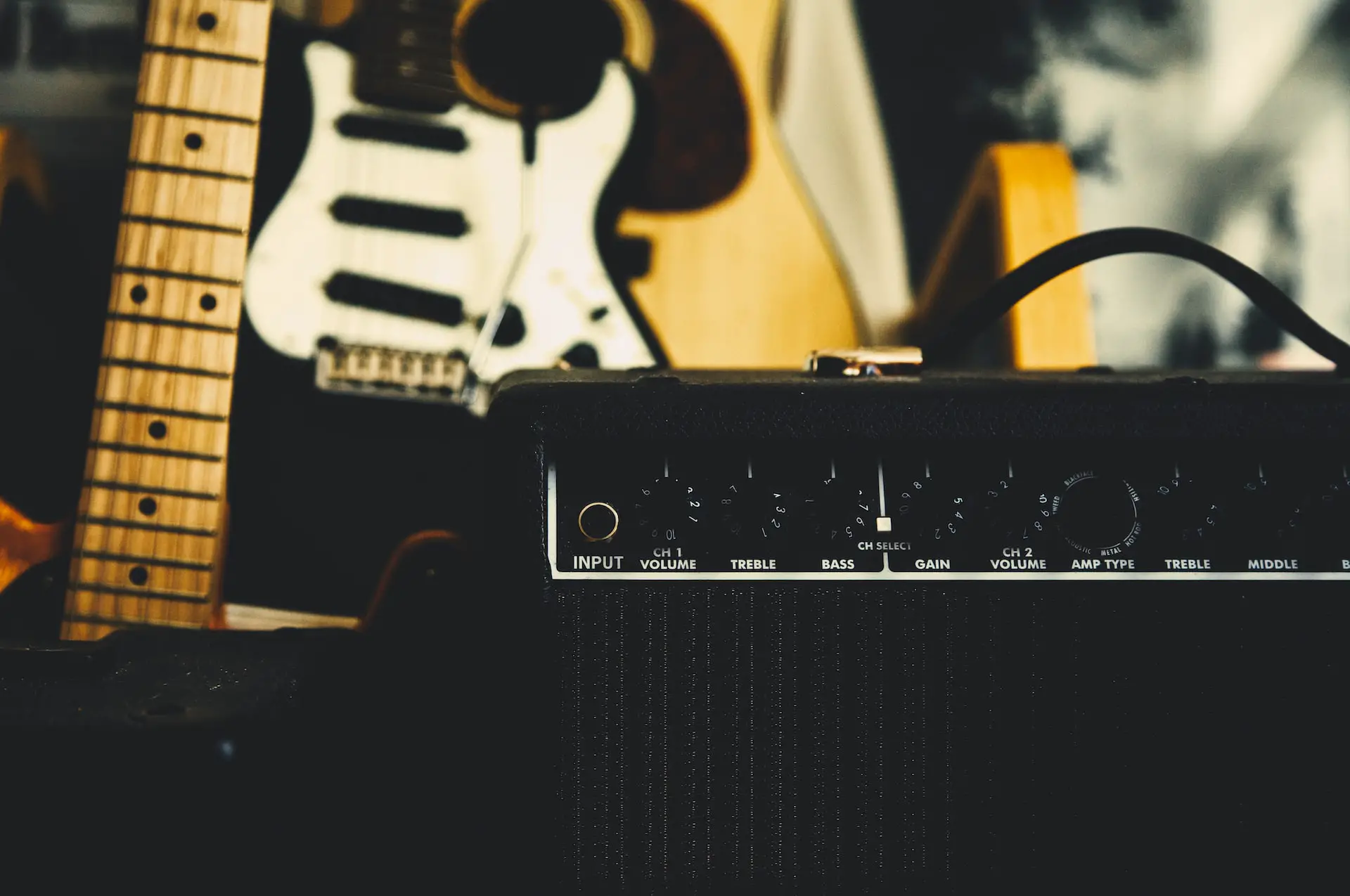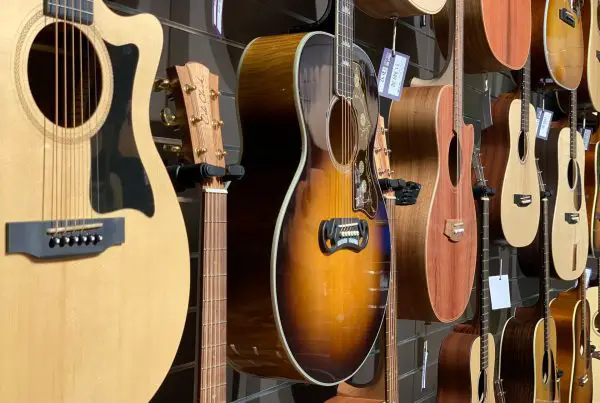Playing the guitar through a bass amp is technically possible to do. However, it will produce a different sound quality than you would like it to since the bass amplifier has different controls and settings than a guitar amplifier.
As someone who has played the electric guitar and bass guitar for over seven years, I can confirm that getting a suitable amplifier for your needs and your budget can be a real challenge.
However, I can ensure that you can find something that will fit your needs with some research, patience, and trying out different amplifiers in person (this is the most fun part of the process).
In this article, we will go over several topics that will help you pick the best amplifier for your needs and offer plenty of information to compare and contrast all the options available to you.
We will cover if bass amps can be used as electric guitar amps if an acoustic guitar can be played through a bass amp or not, and we will compare bass amplifiers to electric guitar amplifiers to acoustic guitar amplifiers.
Additionally, we will cover tone differences between bass amplifiers, acoustic guitar amplifiers, and electric guitar amplifiers.
These differences will include the differences in the tones they produce, the frequencies they all produce, and the settings, costs, and sizes of the guitar amplifier, the bass amplifier, and the acoustic guitar amplifier.
We will also go over potential options for one amplifier that can handle both the electric guitar and the bass guitar.
Finally, we will also cover some frequently asked questions, such as if it is safe or not to plug an electric or acoustic guitar into a bass amplifier, if you can play an electric guitar or an acoustic guitar through a bass cabinet or not, and if you really need a bass guitar amplifier or not.
When reading through this, please do not let this become overwhelming. Instead, I suggest thinking of this as a journey where you take this information and experiment with it until you find the best possible amplifier for you.
When going over these different types of amplifiers, please keep in mind that amplifiers will often have cabinets (which are the large boxes that hold the speakers of the amplifier) and the pre-amplifier (the section of the amplifier that has the inputs and the different control knobs to control the sound you produce).
Amplifiers can have what is called the pre-amplifier (a smaller box that has all the knobs to control your sound) and can also have what is called the cabinet (the box holding the speakers). An amplifier can also be one unit that has both the knobs and speakers in it as well.
Also Read: Are Guitar Amps & Cords Universal? (Ft. Bass, Piano & Guitar)
Can Bass Amps Be Used as Electric Guitar Amps?
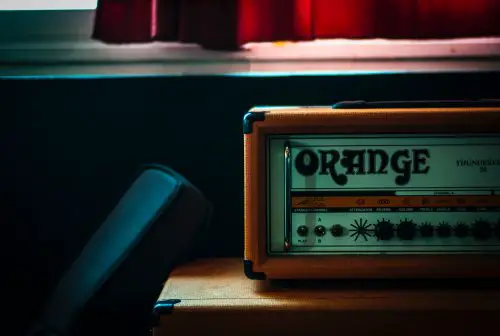
Bass amp can be used to play electric guitar
You can play an electric guitar through a bass amplifier. While it will work to play through the bass amplifier, it will create a different tone than a guitar amplifier. It makes a drier sound.
With the different sounds will be different, there are some options that will help adjust the sound so it will not sound so dry.
Amplifiers will pick up sounds your instrument (guitar or bass) will make and translate the sounds into frequencies that power the speaker in the amplifier, which will then translate into making your playing more audible.
A bass amplifier needs more power since a bass produces lower sound waves and frequencies. A guitar produces higher sounds and frequencies. Since more energy is required to produce lower frequencies, a bass amplifier can handle the frequencies an electric guitar has.
Any sounds that we hear are waves. Human ears can hear sounds anywhere between 16hz and 20kHz. One Hz is one hertz or one wave per second. A kHz is a thousand waves per second.
The lower the frequency (or sound wave), the more power is required to turn that sound wave into a loud enough sound to power the speaker. Bass amplifiers, therefore, need more energy to carry the lower frequencies through the amplifier.
A typical note on the bass will create sounds between 31hz and 5khz. A standard electric guitar note will carry between 100 Hz and 5khz.
Since bass amplifiers need more power to convert the lower frequencies to audible sounds, bass amplifiers have plenty of power to handle the frequencies that the electric guitar produces.
This is why a bass amplifier can be used for guitar playing. However, since the bass amplifier is set to handle different frequencies than a guitar will, it will create a different sound for the guitar.
The sounds it will create can vary based on if the bass amplifier is a tube or solid-state amplifier. A tubed bass amplifier will generally sound better.
Playing guitar through the bass amplifier will generally sound just fine if you use effects pedals. However, if you are attempting to play with an overdrive or distortion effect, you are better off just playing through the electric guitar amplifier.
Can You Play an Acoustic Guitar Through a Bass Amp?
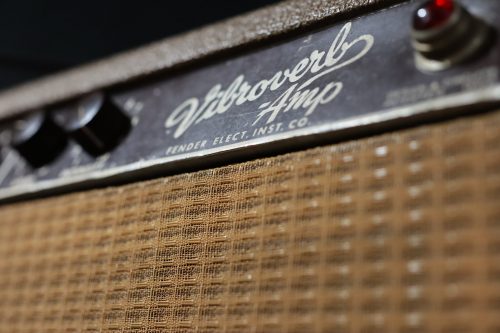
Bass amp can be used to play an acoustic guitar
An acoustic guitar can be played through the bass amplifier. Guitars (be they acoustic or electric) create a high enough frequency that the bass amplifier will be able to carry the signal.
Amplifiers designed for acoustic guitars generally have a clean, less distorted tone. This is because the acoustic guitar is usually played with a more pristine sound with fewer effects than the electric guitar sounds.
Although the amplifier can carry the sound an acoustic guitar produces, your results may vary based on the tone it will make.
I suggest keeping the bass amp on the ‘clean ‘channel as much as possible to get the best possible tone. You can also experiment with potentially adding a little bit of reverb.
Bass Vs Electric Vs Acoustic Amp
| Bass Amp | Electric Guitar Amp | Acoustic Guitar Amp | |
| Tone | Punchy harder tone to carry lower frequencies bass guitar produces. | more gain, more distortion for effects wider tone range | Lower tone range. More natural sound that is simply louder than an acoustic guitar on its own |
| Frequencies | 30hz to 400khz | 80khz and 4.5khz | 80hz to 1200 Hz |
| Settings | gain, bass, middle, treble, presence, and master controls | can be two separate gain controls, treble, bass, middle, volume, and reverb. clean, overdrive Can have additional controls depending on the amplifier. | clean, overdrive, reverb, treble, and master controls. |
| Size | Largest sized speakers. Usually, all one size | Mid-sized speakers (usually all one size) | One large speaker with additional smaller speakers (aka tweeters) |
| Cost | $400.00 to $1700.00 | $100.00 to $2500.00 | $350.00 to $650.00 |
1. Tone Difference: Bass Vs. Electric Vs. Acoustic Amp
Electric guitar amplifiers produce a louder sound with more gain and more distortion for effects and to add different colors to the tone that will create a broader range of effects.
Acoustic amplifiers, however, will produce a cleaner and more transparent signal that will allow you to hear the acoustic guitar as it is meant to sound.
It is simply at a louder volume than you would listen to an acoustic guitar being played naturally with no amplifier. The acoustic amplifier has a more natural tone to it.
Bass amplifiers have a louder, punchier tone to them than both the electric guitar amplifier and the acoustic guitar amplifier.
Bass amplifiers create a more powerful sounding tone since they carry more power and wattage than acoustic and electric guitar amplifiers. Bass amps need this additional power to carry the lower frequencies the bass guitar produces.
2. Frequencies: Bass Vs. Electric Vs. Acoustic Amp
Acoustic guitar amps produce frequency ranges of 80hz to 1200 Hz. Electric guitar amps have frequency ranges of 80khz and 4.5khz. Bass amps have frequencies between 30hz to 400khz.
Electric guitar amplifiers typically will not handle frequencies below 80hz. A Bass amplifier will easily handle these frequencies. The lower the frequency, the lower the sound. Bass amplifiers are designed to handle the lower frequencies to produce lower frequency sound, aka bass sounds.
The frequency of an acoustic guitar amplifier is slightly smaller than that of an electric guitar amplifier. While both guitars create frequencies of roughly the same range, the acoustic guitar amplifier will produce a somewhat more comprehensive range of frequencies.
To restate this, an acoustic amplifier is designed to amplify the natural sound the acoustic guitar makes. The electric guitar amplifier is designed to amply the sound the electric guitar makes but to add in extra effects that the electric guitar produces.
Since the electric guitar’s effects can be made at a slightly higher frequency, it does not need the lower frequency range that the acoustic guitar amplifier needs.
This happens because the acoustic guitar will create a lower frequency produced by the sound of the string ringing in the sound hole and hollow body of the acoustic guitar. This sound naturally vibrates at a lower frequency than the electric guitar does.
To sum this up, bass amplifiers start at the lowest frequency range. Guitar amplifiers have the highest frequency range. Acoustic guitar amplifiers are mid-range frequencies.
3. Available Settings: Bass Vs. Electric Vs. Acoustic Amp
Bass amplifiers will have knobs controlling things like gain, bass, middle, treble, presence, and master controls.
Bass amplifiers have different settings than electric guitar amplifiers. Bass amplifier settings are designed to handle lower frequencies.
Electric guitar amplifiers have additional controls. They can be two separate gain controls, treble, bass, middle, volume, and reverb.
They will often include these settings and all of the settings the acoustic guitar amplifier has.
Acoustic guitar amplifier knobs include clean, overdrive, reverb, treble, and master controls. These are designed to pick up all the clear tones produced by the acoustic guitar.
4. Size: Bass Vs. Electric Vs. Acoustic Amp
Bass amplifiers have larger-sized speakers than electric guitar amplifiers do. This is required due to the more power and intensity of the signal needed to produce the frequencies carried by the bass guitar.
Acoustic amplifiers usually come with one main speaker accompanied by several smaller speakers, also known as tweeters. This helps to create a louder but more natural tone that the acoustic guitar needs.
Electric guitar amplifiers will have several speakers that are usually the same size. They can be one speaker, two speakers, or four speakers. This will vary depending on the size of the amplifier itself.
5. Cost: Bass Vs. Electric Vs. Acoustic Amp
A bass amplifier can cost between $400.00 and $1700.00. This will vary depending on the speaker size for the cabinet and the pre-amplifier.
The cost of an electric amplifier has a broader price range, which can be below $100.00 and can go as high as can average between $2500.00. The cabinet size and the pre-amplifier can influence this range.
The cost of the Acoustic amplifiers can range from $350.00 to $650.00. Acoustic guitar amplifiers are at a lower range in price since they essentially increase the volume of the already natural sound that electric guitar amplifiers carry. They do not need the extra settings and effects of an electric guitar.
Also Read: Bass Vs Guitar As First Instrument: Which Is Better To Start
Can You Use One Amp for the Bass and Guitar?
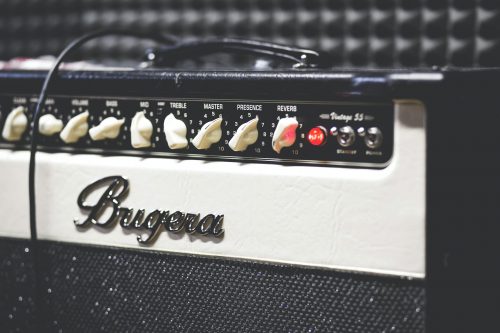
There are some amps you can use for bass and guitar
There are a few two-in-one options that you can use for bass amplifiers and guitar amplifiers.
However, when picking an option for a bass and guitar amplifier, it is best to ensure that you get something with as much wattage as possible. This is because more power is needed to handle the output that playing the bass will require.
Here are some options that other guitar and bass players recommended:
1. Fender Rumble 40
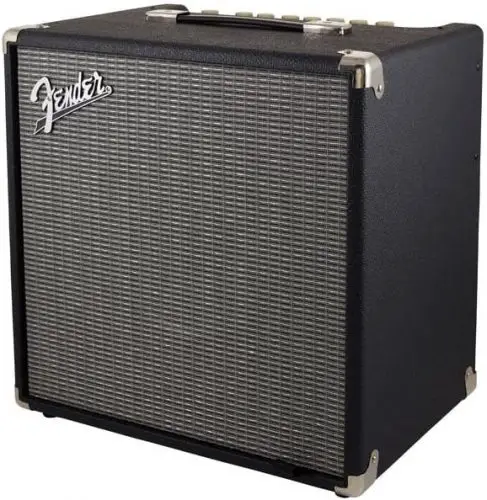
2. Fender Rumble 15
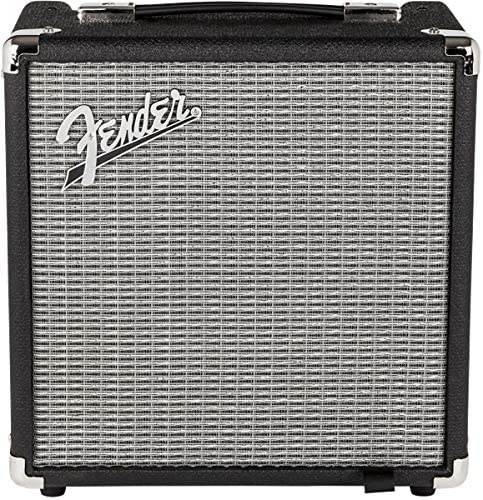
3. Ampeg v4b
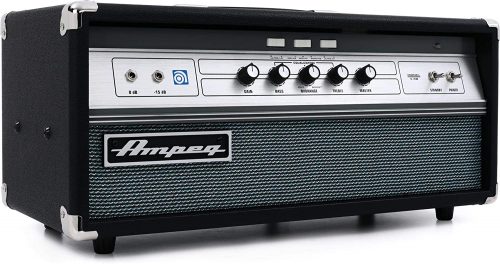
FAQs
Q: Is It Safe to Plug a Guitar Into a Bass Amp?
Plugging a guitar into a bass amplifier is safe and will not cause any damage. Bass guitar amplifiers are designed to handle lower frequencies, which will require more power to play the bass’s frequencies.
Since the guitar amplifier does not require the same power the bass amplifier does, the bass amplifier can easily handle the output the electric guitar produces.
Plugging a bass into a guitar amp, however, has the potential to destroy the speakers on your guitar amplifier completely.
This is because the speakers are not designed to handle the power and intensity a bass output produces.
The cost of the permanent damage to replace speakers and potentially replace any of the internal circuits of a guitar amplifier can be significantly high.
Q: Can You Play Guitar Through a Bass Cabinet?
Yes, you can play the electric guitar through a bass cabinet. The speakers for an electric guitar amplifier are usually not the same size as the speakers in the bass cabinet.
Since the speakers in a bass cabinet can handle the additional power and intensity that playing bass will put through them, they can easily take the lower intensity that an electric guitar can put through it.
Q: Do I Really Need a Bass Amp?
If you play bass exclusively or if you play bass occasionally, then yes. You do need a bass amplifier.
Playing a bass through a guitar amplifier is possible. However, it will eventually ruin the guitar amplifier since it is not designed to handle the same output that a bass guitar will put through it, especially at louder volumes.
Conclusion
This article covered several topics to help you pick the best amplifiers and or cabinets for your needs, as well as offer plenty of information to compare and contrast all of the different options available to you.
We confirmed that bass amps can be used as electric guitar amps and that acoustic guitars can also be played through a bass amplifier.
This article also went over the comparisons between bass amplifiers, electric guitar amplifiers, and acoustic guitar amplifiers.
We also covered all of the tone differences between bass amplifiers and acoustic guitar amplifiers, and electric guitar amplifiers.
These differences will include the differences in the types of tones they produce, the frequencies they all make, and the settings, costs, and sizes of the guitar amplifiers, the bass amplifiers, and the acoustic guitar amplifiers.
We also reviewed several potential options for one amplifier that can handle both the electric guitar and the bass guitar, as well as the acoustic guitar.
Finally, we answered some frequently asked questions and confirmed that it is safe to plug an electric and an acoustic guitar into a bass amplifier.
We also confirmed that you could play an electric or acoustic guitar through a bass cabinet. We also confirmed that a bass guitar amplifier is required primarily if you play bass.
This article covered a lot of information regarding the different amplifiers for the bass guitar, the electric guitar, and the acoustic guitar.
While it was a ton of information, it is helpful to remember that this can be and should be a fun experimental process.
Take your time and experiment in person with different amplifiers to best suit the needs of the instrument you are playing while also meeting the parameters of your budget. You will eventually find the best option for you.
Amplifiers are there to help you create the best possible sound you can when playing your instrument. Have fun with it, and enjoy the process.


